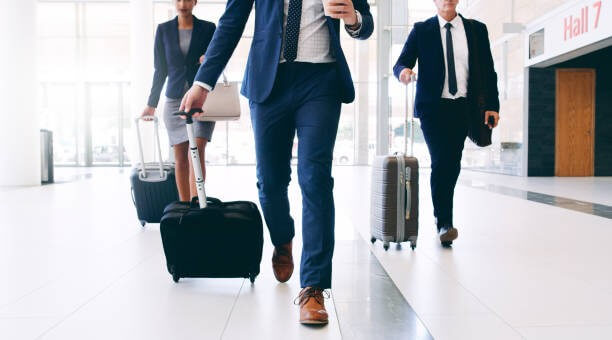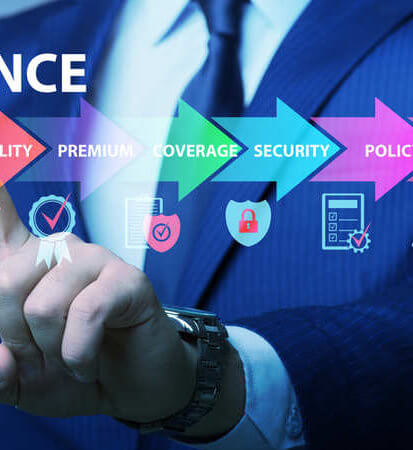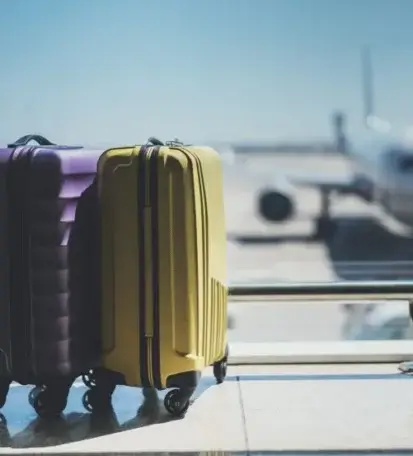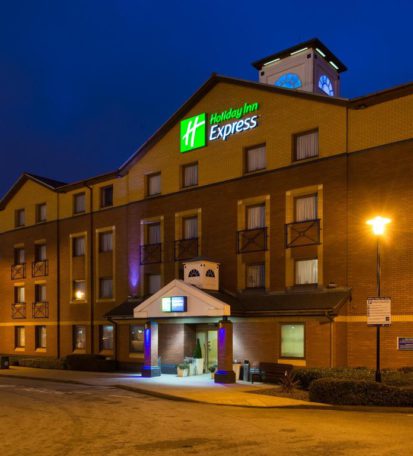Business Travel
First Business Travel: 8 Essential Tips for a Successful Trip

Embarking on your first business travel can be a rite of passage for many professionals. It presents an opportunity to represent one’s company in new environments, forge valuable connections, earn business travel incentive, and sometimes even explore new cultures.
Early preparation is key to maximizing the benefits of the journey, and this begins with a clear understanding of what the trip entails and what is expected. Knowing the cultural norms and business etiquette of the host country can be instrumental in leaving a lasting impression.
Careful planning of the itinerary and packing the right essentials ensures that the trip runs smoothly. Being equipped with the necessary technology to stay connected is important for both managing work commitments back home and delivering on objectives while away.
Keeping track of expenses diligently is also crucial for subsequent reimbursement and budgeting for future travel. Above all, health and safety should never be compromised, regardless of the destination or the purpose of the trip.
Planning Your Itinerary
When embarking on their first business trip, one must meticulously plan their itinerary to ensure efficiency and preparedness. You should consider vital aspects like destination research, flight bookings, accommodation options, and local transportation.
Destination Research: Thorough destination research is crucial for a successful business trip. One should be aware of the local customs, business practices, and any potential safety concerns. Checking out the dos and don’ts of business travel can guide the cultural norms and help anticipate requirements such as visas or vaccinations.
Booking Flights: Securing flights well in advance often ensures better rates and preferred seating arrangements. Consideration of the flight timings, routes, and any layover requirements is paramount. It’s advisable to adhere to the company’s travel policy while making flight arrangements.
Accommodation Options: Choosing the right accommodation hinges on both its proximity to meeting venues and the amenities offered. Individuals should compare multiple options, considering both price and convenience. For detailed steps on booking accommodation, one might review guides like comprehensive business travel arrangements.
Local Transportation: Planning for local transportation is an often underappreciated aspect of trip planning. One should investigate the most efficient modes of ground transport, like taxis, ride-sharing apps, or public transport systems. The aim is to ensure that they have a reliable means to navigate between appointments with minimal delay.
Packing Essentials
When embarking on one’s first business trip, it’s crucial to ensure that all packing essentials are accounted for to facilitate a seamless experience. This section delves into the vital categories that one should focus on travel documents, suitable apparel, and technology needs.
Travel Documents: These are the non-negotiables for any business traveller. Passport, visa, itinerary, and boarding passes should be top of the list. It’s advisable to carry both physical and digital copies
Suitable Apparel: Every business traveller needs to present a professional image, therefore, selecting the appropriate attire is paramount. Aim to pack a versatile wardrobe that can be mixed and matched for different occasions – a tailored suit, dress shirts or blouses, and smart casual options for less formal meetings.
Technology Needs: Staying connected and operational is essential in today’s business environment. Ensure the inclusion of items such as a laptop, smartphone, relevant chargers, and international adaptors. A portable power bank can be a lifesaver during long flights or back-to-back meetings.
Understanding Business Etiquette
This involves recognising and respecting cultural differences, adhering to meeting protocols, and navigating the complexities of gift-giving customs.
Cultural Awareness: Every country possesses its own unique set of cultural norms and practices. Travellers should invest time in learning about these distinctions before embarking on their journey.
Meeting Protocols: Meetings across the globe follow various formalities that one must observe. Proper greetings often involve a handshake, but the firmness and duration can vary widely. In Europe, a firm grip is common, contrasting with some Asian cultures where a lighter touch is preferred.
Gift-Giving Customs: The act of gift-giving can be a potent tool in fostering business relationships. However, it must be approached with sensitivity towards the cultural context.
For instance, in China, gifts should be presented with both hands and accepted only after a degree of polite refusal. One must ensure that gifts are not construed as bribes, which means they should be thoughtful but not overly extravagant.
Staying Connected
When embarking on a business trip, a traveller’s ability to stay connected is paramount.
Communications Infrastructure: A traveller needs access to a reliable communications infrastructure. Before departure, one must verify whether the destination offers widespread cellular coverage and the availability of international roaming.
Time Zone Management: Effective time zone management is crucial to maintain productivity and avoid scheduling mishaps. Tools such as world clocks and online meeting schedulers can assist in planning across different time zones.
Internet Accessibility: Travellers should inquire about Wi-Fi availability in accommodation, co-working spaces, and other venues relevant to their business needs. Portable Wi-Fi devices or international data plans are also options for ensuring uninterrupted internet access.
Health and Safety
Ensuring health and safety during business travel is pivotal. Travellers should secure comprehensive travel insurance, adhere to medical precautions, and be aware of emergency procedures.
Travel Insurance: This is a fundamental aspect of business travel. Policies should cover medical emergencies, lost luggage, and trip cancellations. Employers are advised to verify that the business travel insurance coverage meets the requirements of their travellers’ destinations and the nature of the trip.
Medical Precautions: Before departure, one should consult a healthcare professional to discuss vaccinations and medication. It is also imperative to be informed about the potential health risks associated with the destination, such as food and water safety, and take necessary precautions like only consuming safe food and bottled beverages.
Emergency Procedures: Travellers should familiarise themselves with the local emergency numbers and the location of the nearest embassy or consulate. Companies must equip their employees with an emergency contact list and ensure they understand the employer’s duty of care in the event of a crisis.
Expense Tracking
Effective expense tracking is a critical component of business travel management.
Budget Planning: One must determine the total travel budget before embarking on a business trip. This involves not only estimating the costs for flights and accommodation but also accounting for ground transportation, meals, and incidental expenses.
Receipt Management: Receipts are the foundation of expense tracking. Travellers should collect itemised receipts for all business-related expenses during their trip. To facilitate this, travel management companies have adopted mobile applications that allow you to generate and manage receipts. is accurately recorded.
Reimbursement Policies: Clear reimbursement policies are essential for managing business travel expenses adequately. Employees must be informed of what is reimbursable, the process for submitting expenses, and the timeframe for reimbursement.
Maximising Productivity
In approaching business travel, one’s focus should be centred on the optimisation of time and resources.
Workflow Management: Travel offers a unique chance to reassess one’s workflow, often leading to improvements in efficiency. One should ensure that their time management strategies are robust, allowing for preparation and review during transit. An individual might utilise travel time to prepare for meetings or to catch up on industry-relevant literature.
| Time Spent | Recommended Action |
| In-Flight | Review meeting agendas |
| Commuting | Respond to emails |
| Hotel Stay | Plan the next day’s schedule |
It’s crucial to have access to all necessary work materials, ideally through cloud services that provide seamless access to documents and files from various locations and devices.
Networking Opportunities: Business travel often presents numerous networking opportunities. Engaging with new and diverse individuals can provide fresh perspectives and lead to professional growth and collaboration. They should strive to make connections that extend beyond the duration of the trip, sustaining relationships through follow-up communications.
When attending conferences or meetings, one should:
- Engage with speakers and attendees.
- Exchange business cards.
- Participate in social events related to the business event.
By doing so, they lay a foundation for a diverse professional network that can be instrumental for future endeavours.
Post-Trip Follow-Up
Once a business traveller returns, a systematic approach to post-trip procedures is essential for accurate record-keeping and relationship management.
Expense Reporting: Business travellers must submit their expense reports promptly. They must include all receipts and itemise expenses to ensure transparency and compliance with company policy. Organisations can streamline this process through digital solutions that allow for the electronic submission and tracking of expenses. For example, conducting post-trip reviews is a practice that can highlight areas for financial optimisation.
Meeting Debriefs: The traveller should provide a detailed debrief of their meetings and any actionable intelligence gathered. This ensures that the knowledge acquired doesn’t remain siloed with the traveller but is disseminated across relevant departments.
Relationship Nurturing: Post-trip engagement with clients or partners reinforces the relationships established. Following up with a thank you message, addressing any outstanding queries, and planning for future interactions are all crucial steps.
The timing and method of this correspondence should be considered to maintain professionalism and build ongoing client relationships.
Key Takeaways
- Successful business travel requires meticulous upfront planning and awareness of the destination’s business practices.
- Organisational skills and technological preparedness are essential for maintaining productivity and managing work during the trip.
- Post-trip evaluations and thorough follow-up contribute to professional growth and the effectiveness of future business travels.
FAQs
What is the best travel agency to use?
For tailored travel solutions, Corporate Traveller is regarded as a reliable agency for business travel needs. They offer a user-friendly platform called Melon, providing a streamlined way to book flights, hotels, and car rentals.
What preparations are recommended before embarking on a business journey?
Ensuring all required documentation, such as visas and travel insurance, is in order before departure is crucial. A dedicated agent can assist with navigating complex immigration requirements and making sure travellers have the necessary coverage.
In what ways can business travel add value to professional goals?
Business trips can offer numerous professional advantages including networking opportunities, personal brand development, and exposure to new markets and cultural insights. Engaging directly with clients and industry peers during travel can also lead to strengthened business relationships and collaborative opportunities.




